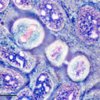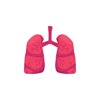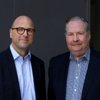Fritextsökning
Artiklar per år
Innehållstyper
-

Forskare skapar miniorgan från fostervatten
För första gången har forskare lyckats skapa organoider från celler som utvunnits från fostervatten. Något som kan öka möjligheten att behandla medfödda tillstånd – före födseln.
-

Kliniskt samarbete med Karolinska ska ge Ukrainas barn bättre vård
Kriget sätter det ukrainska sjukvårdssystemet under hårt tryck, och även barnsjukvården påverkas. För att ge stöd och få till stånd kunskapsutbyte har nu ett brett kliniskt samarbete inletts mellan Karolinska universitetssjukhuset och Kievs största barnsjukhus Ohmatdyt.
-

Icoat Medical startar vetenskapligt råd
Stockholmsbolaget Icoat Medical startar ett vetenskapligt råd med syfte att stärka bolagets forskning och utvecklingsprogram. Rådet består av tre läkare med expertis inom transplantationer.
-

Ozempic may benefit hip replacement surgery
The high-profile drug for type 2 diabetes and weight loss may be beneficial in other areas. One such area is for patients undergoing hip replacement surgery, a new study suggests.
-

Founder of Bioarctic, Lars Lannfelt, is honoured: “I want to create something for the future”
It´s like a scientist’s dream: to be the world’s first with a drug that genuinely affects one of our major diseases. Lars Lannfelt and his company Bioarctic have achieved just that, and they are thus making a significant contribution to the history of Swedish medicine. He is now being awarded the Research!Sweden Award 2023.
-

The physician at the tech giant: “Observations in the emergency room made my mind up”
When Nasim Farrokhnia was in third grade at school in Tehran, the capital of Iran, her father gave her a book about Marie Curie, which soon became her favourite book. Perhaps her interest in science was born there and then, as science and new technology have since been a constant feature of her working life. Today, she is a Healthcare Manager in Microsoft’s Western Europe team.
-

Study names with an attitude – more important than you might think
Ironman, T-rex, Star-Trek. Popcorn, Proper, Scout. Nope, these are neither fantasy films nor dog names. They’re the names of ongoing cancer studies in Sweden.
-

The first drugs to slow down Alzheimer’s – but what does it mean for patients?
New treatments for early Alzheimer’s are bringing hope to thousands of patients and their families. The question is, who will get the treatment, how will the right patients be found in time, and will the healthcare system’s resources be sufficient? Life Science Sweden has spoken to Swedish researchers in Alzheimer’s who voice cautious hope but also see further challenges.
-

Pfizer’s Paxlovid is being tested against post-COVID in a major Swedish study
In a new study conducted at the Karolinska University Hospital, Pfizer’s COVID drug, Paxlovid, is now being tested in patients with post-COVID. The study is one of the most extensive studies in the world currently being conducted for a drug for post
-

From the sea of Åland to a self-test for lithium
Four years ago, a meeting on the sea of Åland resulted in the development of a self-test for lithium levels in the blood. The hopes are that the test will be available for individuals with bipolar disorder in the future.
-

Heidi Stensmyren is eager for new challenges in the biotech industry
Heidi Stensmyren has served as President of the Swedish Medical Association, held a managerial position at Karolinska University Hospital and is now Medical Director at a biotech company. “I’m curious and like to have influence, so I’ve often chosen
-

Första pillret mot förlossningsdepression godkänt i USA
Den första orala behandlingen specifikt inriktad på förlossningsdepression har godkänts av FDA.
-

Medivir tar in rådgivare för utveckling av läkemedelskandidat
Det svenska forskningsbolaget Medivir har startat ett vetenskapligt råd i syfte att bistå i arbetet med utvecklingen av företaget läkemedelskandidat.
-

Uppgörelse klar om Henrietta Lacks odödliga celler
Sedan över 70 år lever Henrietta Lacks celler vidare i laboratorier världen över, och har bidragit till medicinsk forskning som räddat otaliga liv. Själv visste hon inte ens om att cellproverna togs och ingen kompensation har getts – förrän nu.
-

Behandling för svår nervsjukdom EU-godkänns för unga
Astra Zenecas läkemedel Soliris har fått klartecken av EU-kommissionen och blir därmed den första godkända, riktade behandlingen för barn och ungdomar med den sällsynta neuromuskulära sjukdomen myastenia gravis.
-

Lucy Robertshaw: Artificial intelligence – is this really going to transform a patient’s life?
In a column Lucy Robertshaw reflects on how AI and new regulations will affect healthcare, innovation and the lives of future patients.
-

AstraZeneca moves to brewery quarters in central Copenhagen
AstraZeneca in Denmark is moving its business into central Copenhagen and the old brewery quarters in Carlsberg Byen.
-

Nanoparticles to help detect pulmonary disease
Nanoparticles behave in a certain way in the air. Using this knowledge, researchers at Lund University have developed a new measurement method for lung examinations based on the phenomenon.
-

Rapid developments in AI – “All stakeholders are struggling to understand it”
Artificial intelligence is being discussed more and more, and developments in the field are moving rapidly. As the Swedish Medical Products Agency testifies, keeping up with developments is not easy.
-

Looking for greater Nordic cooperation – “We have Norway and Finland in our sights”
How can Medicon Valley Alliance bring the big pharmaceutical companies back to the organisation? Life Science Sweden discussed this topic and others with the cluster organisation’s new radar pair.
-

Uncertainty about the government’s life science work
The government’s national coordinator for life science, Jenni Nordborg, left her position almost four months ago. No one has yet succeeded her, and now questions are being raised both about the government’s plans for the office and the Swedish life science strategy.
-

KI’s new President: “We need to work closer together”
A closer link between research and education and a stronger “we-feeling” are aims that Annika Östman Wernerson sets out to achieve as the new President of Karolinska Institutet. She will not give up her research entirely though. “I think it’s crucial to maintain a close presence in the business,” she says.
-

Major advances in IVF labs in the last few decades
Since the introduction of in vitro fertilisation several decades ago, many developments have been made in the field, and the main part of that development has taken place in the lab.
-

Karolinska sjätte bästa sjukhus i världen enligt ny rankning
Den amerikanska tidskriften Newsweek rankar varje år världens bästa sjukhus. 2023 finns Karolinska universitetssjukhuset på sjätte plats.